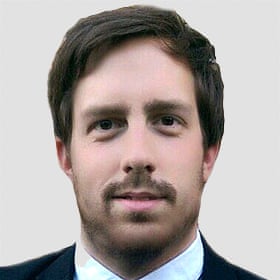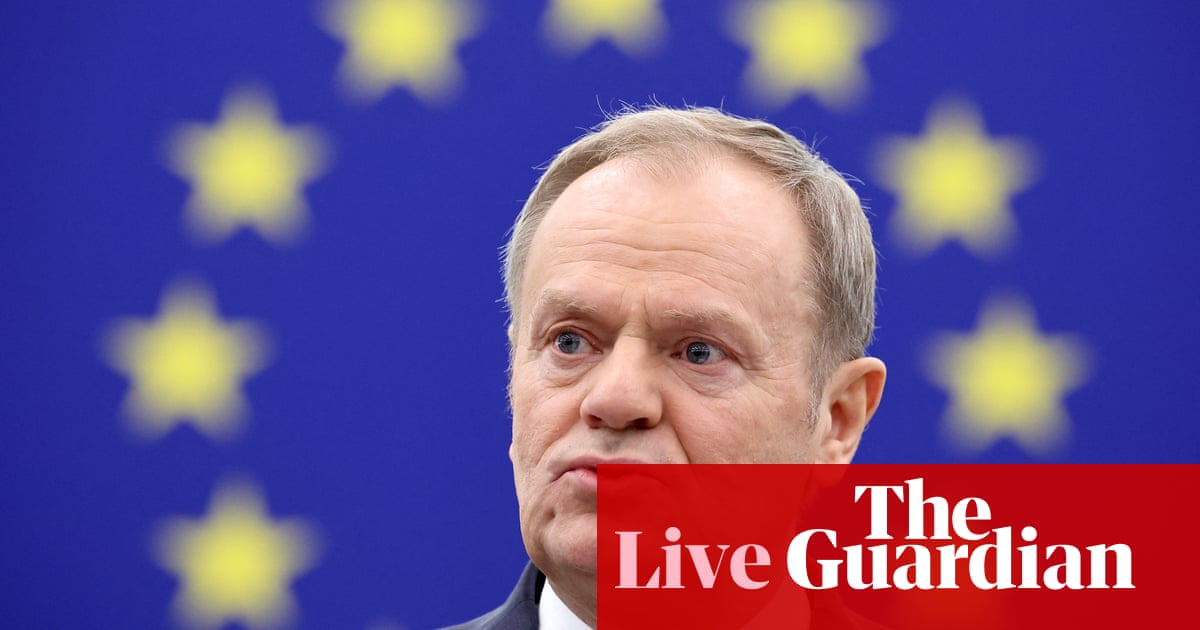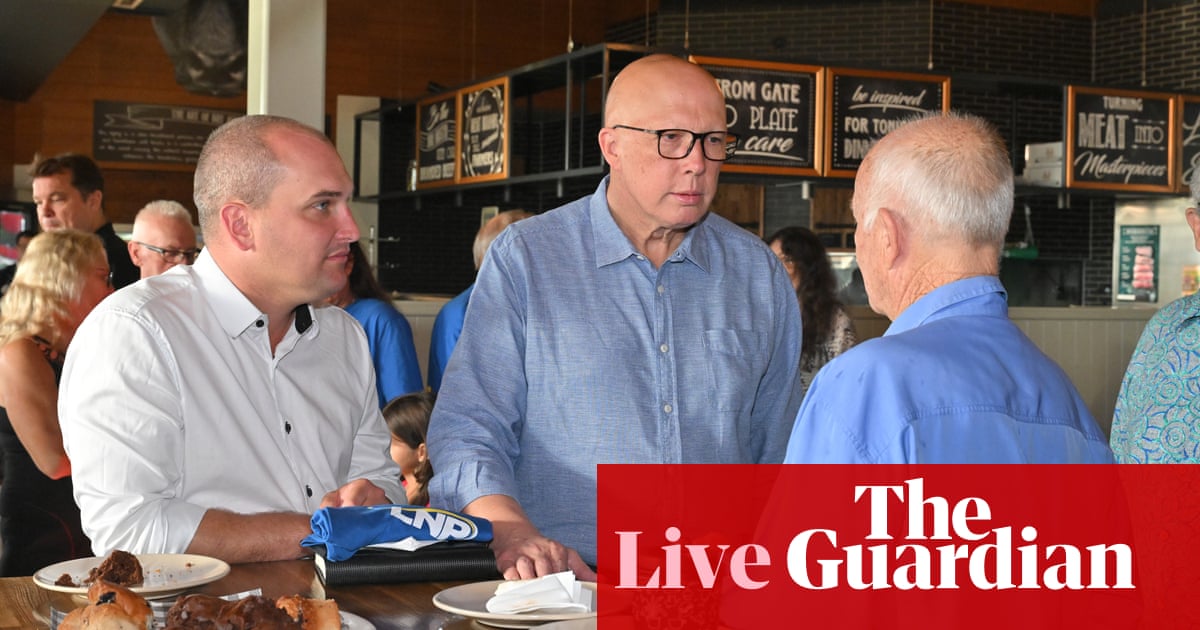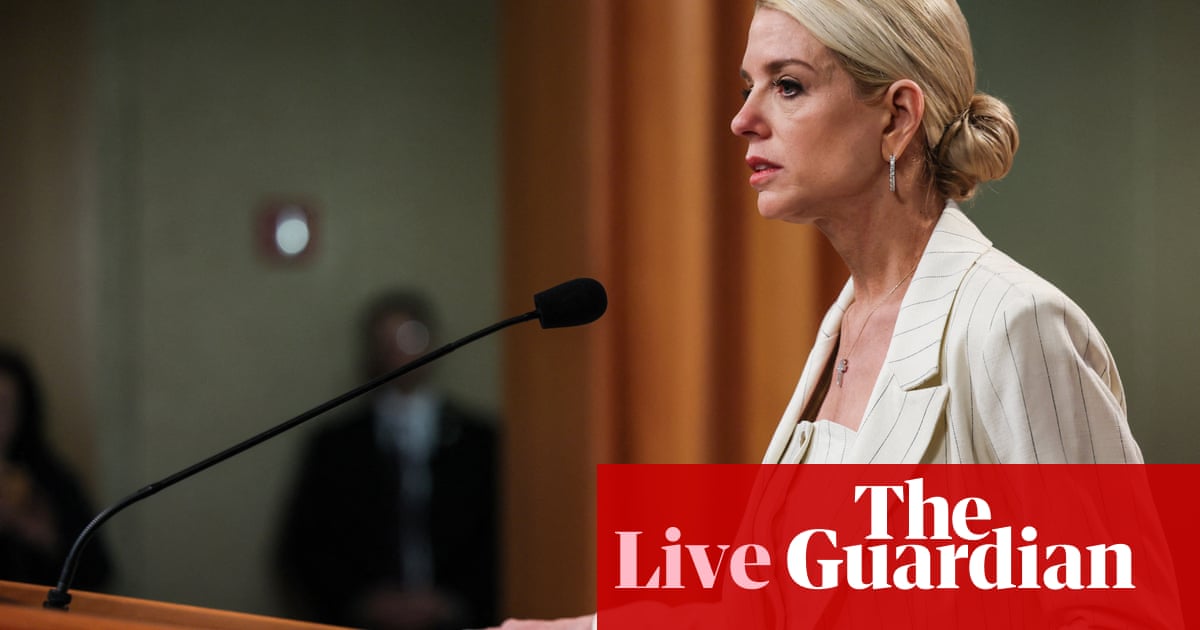‘Keep your heads high’ Poland’s Tusk urges Europeans, but warns ‘the time of comfort is over’

Polish prime minister Donald Tusk has been speaking in the European Parliament, delivering a wide-ranging speech on the future of the EU, with some strong quotes about what he sees as both opportunites and challenges for the bloc.
Poland has taken over the EU’s rotating presidency on 1 January, and Tusk, former president of the European Council, wants to use his experience to help the bloc in these uncertain times.
We are dealing with an active conflict on our borders. We have to deal with technological progress, which is sometimes uncontrolled. All of this leads to this feeling of loss of certainty on the part of a large number of our citizens.
But objectively speaking, Europe should not be fearful about its future. … The most important words here today should be addressed directly to Europeans: keep your heads high.
It is true that what is happening around us … is a whole new set of challenges for Europe. But Europe was created exactly to face such challenges.
His speech has at times a Love Actually-esque vibe about it as Tusk insists that Europe has no reason to feel inferior to or afraid of changes in the US administration.
He goes on to talk about how Europe should take pride in its achievements and being “the birthplace of the greatest discoverers, inventors, strategists,” name-checking Alexander the Great, the Vikings, and Columbus (and somewhat on-the-nose reminding everyone that we discovered America).
But as he turns to solutions, he picks up more serious language again:
Now the party is over. The time of comfort is over.
Key events
Micheál Martin set to become Ireland’s taoiseach

Lisa O’Carroll
Now, as promised earlier, let’s take a quick look at what is happening in Dublin where Micheál Martin is set to become Ireland’s taoiseach for a second time with a new coalition government to take office later today.
The first day of the new government, normally a ceremonial affair, was marred by angry scenes with the Dáil speaker, Verona Murphy, forced to suspend proceedings twice, Lisa O’Carroll reports.
Opposition parties including Sinn Fein, Labour and independents in the People Before Profit alliance are furious that independent TDs who have entered a formal agreement to prop up the coalition government are looking to sit on opposition benches eating up critical speaking time.
Sinn Féin leader Mary Lou McDonald said it was “completely unacceptable” while Labour TD Alan Kelly branded the situation “a farce”.
Martin was expected to travel to Dublin to Aras an Uachtarain, the official residence of the president, where Michael D Higgins will sign the warrant of appointment and hand him the Seal of the Taoiseach at around 2pm.
But this is now likely to be delayed by up to an hour after proceedings had to be suspended after the angry row over speaking rights, with the new cabinet not expected to be named until late afternoon.

Tusk’s comments show EU tensions over climate, nature protection laws – analysis

Jennifer Rankin
Poland’s prime minister Donald Tusk has said the EU needs to “have the courage” to change environmental rules that he blamed for high energy prices, our Brussels correspondent Jennifer Rankin writes in our first take on his speech.
In a wide-ranging speech to the European parliament on Europe’s role in the world (see 11.28 CET) and defence (see 11.51am), Tusk also devoted substantial attention to the EU’s competitiveness, urging deregulation and “simplification” of EU rules.
It was a further sign that tensions over climate and nature protection laws are set to be a defining argument of the next five years for the EU.
Between 2019 and 2024 the EU adopted some of the most ambitious environmental legislation in the world. With many key policies yet to be fully implemented, there is a growing chorus to rethink elements of the EU green deal or other laws.
Tusk said no one in the room would question the need for action on climate change – a heroic assumption, given the high numbers of climate sceptic lawmakers in attendance – then added his own caveat.
But, here is a “but”. Europe cannot lose the global competition, it cannot become a continent of naive people and ideas. If we go bankrupt, no one will care about the natural environment in the world anymore.
He went on to blame EU regulations for high energy prices and called for “a deep, critical and courageous reflection” on moving ahead with the updated and stricter version of the EU’s emissions trading system.
The ETS, launched in 2005 and tightened up in 2023, requires polluters, such as energy firms and heavy industry, to pay for carbon emissions.
Tusk said he warned against introducing the revised law at the current pace: “High energy prices may sweep away many a democratic government in the European Union.”
At the weekend, the centre-right European People’s Party (Tusk’s political family) called for a two-year pause on the EU’s corporate sustainability reporting directive, the corporate sustainability due diligence directive and the carbon border adjustment mechanism, essentially a tax on imports made in polluting factories outside Europe.
Meanwhile Germany’s chancellor Olaf Scholz has called for a rethink of plans to fine carmakers who fail to produce cars in line with EU emission-reduction targets, following lobbying from European companies that are struggling to sell their vehicles amid fierce Chinese competition.
Politicians from the liberal, socialist and green groups responded to Tusk by putting greater emphasis on the need to support the EU’s green legislation.
Picking up the Polish presidency’s security theme, Terry Reintke, the co-leader of the Greens in the European parliament, said:
Security also goes hand in hand with environmental security, because what security is there if floods are endangering our people and are destroying our homes, droughts are killing our crops and when masses of water and wildfires ruin entire infrastructures or [the] economies of whole regions.
But Tusk also faces pressure from the far-right and nationalist politicians, who are the third and fourth strongest forces in the European parliament.
“Were you not president of the European council when this green madness was introduced,” said Anna Bryłka, an MEP for the far-right Polish Confederation party, in a speech laced with hyperbole and personal attacks directed at Tusk. Such interventions are seen as pressuring the EPP to move in a less climate-friendly direction.
German opposition leader Merz calls for pragmatic approach to Trump

Deborah Cole
As we wait for French president Emmanuel Macron to welcome German chancellor Olaf Scholz to Paris later today, it’s probably worth catching up with some news lines from Scholz’s likely successor after next month’s elections.
Here’s a brief note from our Berlin correspondent, Deborah Cole.
Speaking at the World Economic Forum in Davos on Tuesday, the frontrunner in Germany’s election campaign, conservative opposition leader Friedrich Merz, had called for a pragmatic European approach to Trump.
Describing the US president as an “interesting partner”, Merz said: “I think he’ll be ready to do business, also with the Europeans.”
“He’s a dealmaker, so let’s think about what we can offer,” said Merz, head of the centre-right Christian Democratic Union, which has a double-digit lead in the German polls.
Merz said if he became German chancellor after the 23 February election, he would seek to meet Trump “as quickly as possible”. But he stressed it was crucial the Europeans speak with one voice: “As soon as we have a common European position we’ll be seen as a strong partner.”
Asked about Italy’s far-right prime minister Georgia Meloni, who attended Monday’s inauguration and has been mentioned as a potential “Trump whisperer” for the EU during his second term, Merz said the bloc should no longer hold her at arm’s length.
“I don’t understand the reservations about her,” he said, noting her staunch support for Ukraine. “I think she’s very pro-European.”
Spanish PM pushes back on Trump’s defence comments
Meanwhile, Spanish prime minister Pedro Sánchez pushed back on Trump’s criticism of European defence spending earlier (see 10:19).
Speaking to CNBC at the World Economic Forum in Davos, where he is due to speak later today, he insisted that “you have to look more broadly to see if a country is committed or not with the security of NATO’s allies.”
Spain has increased defence spending by 70% in the last decade while its investment of 30% on new equipment was above the 20% required by NATO, he added.
But Reuters noted that Spain’s defence contribution may very well be 10th largest in absolute terms among the 31 Nato allies, but amounts to an estimated 1.28% of its GDP, the lowest in relative terms.
Reminder: Trump specifically picked up on Spain in his comments on defence spending earlier this week, which I brought you yesterday.
Tusk calls for review of EU’s Green Deal policies, deregulation to help EU compete with rivals
Let me bring you just a few more lines from Tusk’s speech this morning as he urged Europe to revisit some of its green energy policies and think about a deregulatory push to help European companies compete with US and Chinese rivals.
Let us be courageous and stay away from routines. … [We] should not just read the Draghi report and other words of warning, but actually roll our sleeves and start working. We need to change the status quo … propose to Europe a big campaign of deregulation.
It’s unacceptable that our European energy is the most expensive [in the world]. If it cannot be the cheapest one, at least it should be more or less on the same level as in other countries. … We all want to compete against the US or China, but our energy prices are three times as high. …
We are well aware of the potentially disastrous consequences that would follow if we do not act [on climate], but we cannot afford not to be competitive. If we do go bankrupt as Europe, who will protect the environment instead of us?
So, let us put our thinking caps on and conduct a thorough review of all legal acts, including those under the Green Deal. We should identify problems, and have the courage to change those rules that might result in excessively high, prohibitively high energy prices.
He said that politicians ignoring calls to review these policies do it at their peril, as “too high energy prices may bring down many democratic governments.”
But he closes on a positive note again as he says:
It’s all up to us. The future is in our hands, not in the hands of the Chinese or the American people.
And that’s it.
Tusk, a historian by training, also urged Europe to increase its defence spending:
Some people think it’s extravagant or wrong to warn that we should spend up to 5% of GDP on our security. … But this is a time when Europe cannot afford to save on security.
We spend 5% not on our own security, but also on the security of the whole of Europe. … If Europe is to survive, it needs to be armed.
It is not our choice. I’m not a militarist. No one in Poland would like to see another war. We have suffered greatly, most in Europe, and perhaps that is why we understand it so well: in order to avoid repeating history, we need to be armed.
‘Don’t ask what America can do for Europe’s security, but ask what we can do,’ Poland’s Tusk tells EU lawmakers
In a passage directly responding to Donald Trump’s comments on what he sees as Europe’s inadequate financial contribution to shared security (see 10:19), Poland’s Tusk paraphrases the memorable quote from John F Kennedy’s inaugural address in 1961 as he says:
Do not ask what America can do for Europe and its security; ask what ourselves we can do for our security.
Both the tone and the message appear to be very similar to that of Ukraine’s Volodymyr Zelenskyy, who warned in Davos that Europe needed to step up its game and stop relying on the US (below and in yesterday’s blog).
Tusk also seems to be a glass half full person as he tries to put a positive spin on Trump’s words:
The new president of the US says that Europe needs to share our take of responsibility for our security. Only an ally can wish another ally to get stronger. It is not what an opponent of Europe would say.
‘Keep your heads high’ Poland’s Tusk urges Europeans, but warns ‘the time of comfort is over’
Polish prime minister Donald Tusk has been speaking in the European Parliament, delivering a wide-ranging speech on the future of the EU, with some strong quotes about what he sees as both opportunites and challenges for the bloc.
Poland has taken over the EU’s rotating presidency on 1 January, and Tusk, former president of the European Council, wants to use his experience to help the bloc in these uncertain times.
We are dealing with an active conflict on our borders. We have to deal with technological progress, which is sometimes uncontrolled. All of this leads to this feeling of loss of certainty on the part of a large number of our citizens.
But objectively speaking, Europe should not be fearful about its future. … The most important words here today should be addressed directly to Europeans: keep your heads high.
It is true that what is happening around us … is a whole new set of challenges for Europe. But Europe was created exactly to face such challenges.
His speech has at times a Love Actually-esque vibe about it as Tusk insists that Europe has no reason to feel inferior to or afraid of changes in the US administration.
He goes on to talk about how Europe should take pride in its achievements and being “the birthplace of the greatest discoverers, inventors, strategists,” name-checking Alexander the Great, the Vikings, and Columbus (and somewhat on-the-nose reminding everyone that we discovered America).
But as he turns to solutions, he picks up more serious language again:
Now the party is over. The time of comfort is over.
Catch-up: German reactions to Musk’s gesture

Kate Connolly
Much was said over the last 48 hours about Elon Musk’s apparent use of a salute banned for its Nazi links in Germany.
Do you wonder what the Germans make of it? The Guardian’s Kate Connolly looked into this and it’s complicated. Some say it was an unambiguous Nazi salute but others are unsure and say focus should be on Musk’s stated support for far-right.
Here is her report.
Catch-up: Latest on Ukraine; Trump’s comments overnight
For a quick update with the latest on Ukraine war, check our explainer below.
Speaking overnight, Donald Trump addressed this topic too, saying it “sounds likely” that the US would impose sanctions on Russia if they refuse to take part in negotiations on the war in Ukraine.
But then he also raised his longstanding grievance about European allies not contributing enough financially.
We are talking to Zelenskyy, we are going to be talking to President Putin very soon, and we will see how it all happens. …
One thing I do feel is that the European Union should be paying a lot more than they are paying.
Under Biden, we were in there for 200bn dollars more. Now, it affect them more than it affects us. We have an ocean in between. A little thing in between called an ocean. The European Union should equalise. We are in there for 200bn dollars more than the European Union.
What are we, stupid? I guess the answer is yes. They must think so.
Catch-up: Trump threatens EU with tariffs
These new EU concerns come on the back of Trump’s comments overnight that he would hit the European Union with tariffs citing the need to address trade imbalances and explaining the move in his unique style:
They treat us very, very badly. So they’re going to be in for tariffs. It’s the only way you’re going to get back. It’s the only way you’re going to get fairness.
A day earlier, he accused the bloc of not importing enough American products, saying he would “straighten that out” by imposing duties or by urging for more oil and gas purchases.
Jeroen Lenaers spoils the fun, immediately name-checking “He-Who-Must-Not-Be-Named” Donald Trump in his response to von der Leyen’s statement.
The Dutch vice-chair of the centre-right European People’s Party, the largest group in the parliament representing conservative-leaning parties, said that the new geopolitical situation under Trump should serve as “another wake up call that now, more than ever, we need to ensure our own strategic independence.”
With the inauguration of President Trump, we have also entered a new phase of geopolitics. Yes, the US remains an important partner and ally, but it is clear that under the new administration, Europe is also a target.
‘Change coming in global politics,’ EU’s von der Leyen warns
European Commission president Ursula von der Leyen has been speaking in the European Parliament in the last few minutes, with some new comments warning about “the change coming in global politics.”
We’re only three weeks into 2025, and but a glimpse is already there of a change that is coming to global politics. We have entered a new era of harsh geostrategic competition. …
The rules of engagement are changing. Some in Europe may not like this new reality, but we must deal with it. Our values do not change, but to defend them, some things must change. And first, we have to work to do at home.
I wonder who could she possibly be thinking about?
The day ahead
-
Emmanuel Macron and Olaf Scholz hold a press conference in Paris (around lunchtime)
-
European Commission president Ursula von der Leyen is speaking at the European Parliament in Strasbourg now, and will be followed by Polish prime minister Donald Tusk (10:30 CET)
-
Spanish prime minister Pedro Sánchez speaks at the World Economic Forum in Davos (15:45 CET)
-
Micheál Martin is expected to become Ireland’s new prime minister
Much more to come, I am sure.
Morning opening: Scholz travels to Paris for Macron meeting

Jakub Krupa
Guten tag, bonjour, and good morning. It’s Wednesday, 22 January 2025.
German chancellor Olaf Scholz is travelling to Paris this morning to meet French president Emmanuel Macron in what would once be seen as the absolute power meeting at the top of European politics.
This time, it is different – to the point that the German weekly Der Spiegel called it a meeting of two lame ducks.
As Scholz struggles to get his message across and trails in the polls ahead of next month’s parliamentary elections and Macron struggles to deal with a near-permanent political crisis domestically, the celebrations of the 62nd anniversary of the Élysée Treaty are likely to be somewhat muted.
Still there is plenty to talk about: how to best deal with the small matter of Donald Trump, the war in Ukraine, and all sorts of questions about Europe’s position and competitiveness in a dynamically changing world.
What makes things worse, though, is that the two do not seem to particularly get along personally. And they are not alone in this.
A representative poll of 1203 French adults, published last week, shows that for the first time, a narrow majority of the French—51%—actually do not like Germany that much, even if they think Franco-German relations are generally good.
Two-thirds say they do not know Germany particularly well. When asked about their leading associations with the country, they point to the importance of work, the country’s economic power, and, erm, budgetary discipline, all mentioned by over 80% of respondents. Not particularly inspiring.
In a particularly stinging (and, frankly, quite hilarious given the German Embassy in France commissioned the poll) response, the French said that it is all good and well that Germans have a great education system, a strong economy, and inspiring culture, noting the importance of the Franco-German Arte TV channel, but it is… the German language that they see as a particular liability (67%).
Politically, you can see how much has changed over the last few years: in 2020, 53% cited France and Germany as the joint leading force for European integration. Four years later, it was a mere 18%. Ouch.
But some took the results in good stride. In its morning newsletter, the German business daily Handelsblatt spotted that 40% of the French also associated Germans with arrogance.
“Coming from them, it’s surely a compliment?” it quipped.
Welcome to our live coverage of European politics. It’s Jakub Krupa here.
If you have any comments or suggestions, email me at jakub.krupa@theguardian.com. I am also on Bluesky at @jakubkrupa.bsky.social and on X at @jakubkrupa.










